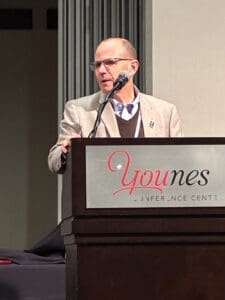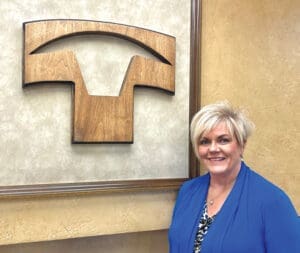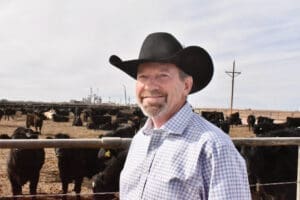By Burt Rutherford, Contributing Editor
![]()
“The Greatest Generation” earned that name in many ways. They endured the Depression as children and World War II as adults. They brought the United States, indeed the whole world, from the brink and initiated one of the greatest economic revolutions this country has ever seen.
But in one way, despite their mental and physical toughness, they weren’t so great. They wouldn’t talk about what they kept locked inside – the emotions, memories and stress they endured silently and stoically.
That’s changing, according to Jason Medows, a Missouri cow-calf producer, pharmacist, father of four active boys and mental health advocate.
And that’s good. But it isn’t changing quickly. “I think there have been some sprinklings of discussion for several years, but I think people throughout the ag industry are recognizing that this is an issue,” he says.
Nonetheless, there’s still a stigma over talking about the things in life that bring on mental and emotional pain. That was the genesis of a non-profit named Rural Minds. It was founded by Jeff Winton after his nephew took his own life, leaving behind 3-year-old twins, according to Julie Lux, the organization’s vice president of communications.
“People in the small farming community said to the family, ‘You’re not going to tell people how he died, are you? You’re going to say he died by a heart attack or he was killed in a farming accident,’” Lux says.
Winton’s mother replied, “No, we’re going to tell people what happened. It’s time we stopped hiding these kind of things.”
So Winton told the story at the young man’s funeral; what happened, what led up to such a tragic ending. “Afterwards, people were lined up to tell their stories. And the family realized at that point how many people in rural America are touched by suicide, substance abuse, depression and many other mental illnesses,” Lux says.
“People are OK talking about somebody having diabetes, someone having a heart condition, somebody having cancer, but not talking about someone who’s dealing with a mental challenge,” Lux says. “Sadly, the stigma is still, in some ways, alive and well.”
That’s why Medows prefers to call it “brain health” rather than mental illness. “When you look at it as a physical thing, it becomes real.” He says we talk about heart health, lung health, bone health, the importance of using sunscreen to prevent skin cancer. “When you say it like that – brain health – it becomes more tangible.”
What to Look For
“Mental health affects everything,” Medows says. “It’s one of the most important things we deal with right now because it’s one of the things we can kind of control. We can control how we take care of ourselves and take care of our health. Ultimately, mental health is the thing that affects everything else.”
Self-analysis can be difficult, especially for people in agriculture who tend to be very self-reliant, stand-alone people. Nonetheless, Medows suggests that folks recognize the things that cause them grief and stress. “Then tackle those things individually.”
It’s easy to get so caught up in the multitude of problems that can crop up in agriculture that you get stuck in the mud, figuratively speaking. “But if we stop and take care of things individually, then we are going to be much more likely to get them taken care of,” he says.
For several years, Medows hosted a podcast called Ag State of Mind, with more than 150 episodes discussing mental health. Following his own advice, however, he discontinued the effort. “My life got busy and something had to go, and that was the easiest for me to let go of.” Those episodes are available at agstateofmind.com.
More often than not, however, it’s someone else who notices that a friend, neighbor or family member isn’t quite the same. “This guy’s not acting like he once did, not acting normal. What’s their baseline, what’s their deviation from baseline? Pay attention to folks and recognize that,” Medows advises.
Then check on people and don’t take “Oh, I’m OK” as the final answer. “I can’t tell you how many times I have put on a really good face when times I’ve been struggling. So dig a little deeper sometimes, take time to get to know people and know what’s going on with their lives. Be a friend,” he says.
“What I’ve found is just pay attention to people. If something’s pushing you to check on somebody or ask a question or dig deeper, don’t ignore that,” he says. “Talk to folks because they may not know how to reach out and ask for help. So sometimes you need to be the one who does the work for somebody else, at least to get them started.”
Lux agrees. “Sometimes it’s just having that initial conversation. It’s saying to someone, ‘You seem like something’s bothering you’ or ‘Hey, I haven’t seen you in church lately. Is there something going on?’”
It may take several attempts and not everything works for everyone, she says.
“And sometimes, you may think that you’re not the person who can help.” So talk with a trusted friend, family member or minister and share your concerns.
If a person does open up and talk, just listen, she advises. “When somebody has a problem, we want to help them. But sometimes that’s not really what people need. What they need is that non-judgmental ear to just listen.”
Resources are available
Several state agriculture agencies have mental health resources, including Texas, Missouri and New York. Some educational institutions, such as the University of Texas at Tyler (FarmLifeHelp.com) also have resources to help.
Rural Minds (ruralminds.org) has fact sheets, programs and other information online, including the Rural Mental Health Resilience Program in cooperation with the National Grange. The program works to raise awareness, reduce the stigma surrounding mental illness and connect people to available resources.
While there isn’t, as of yet, a national rural mental health hub, there is a national helpline available by calling 988, Lux adds.
The need is real. According to Rural Minds, compared with their urban counterparts, rural Americans have a higher rate of depression, and suicide rates of people living in rural counties are 64 to 68 percent higher than those living in urban areas.
But by being a neighbor and a friend, and knowing what signs to look for, that can change. There’s no other alternative.





